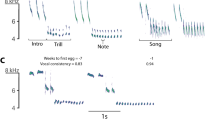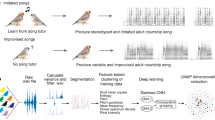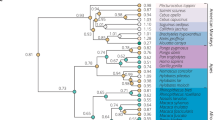Abstract
Studies of species recognition in male birds have often identified features that are distinctive, invariant markers of a species song but which can be altered without altering male response1–4. Such results raise the question of why natural selection has favoured the retention of these features in the song. We propose that such features are favoured by selection because females use them in species recognition even though males do not. There are excellent theoretical grounds for expecting that males and females of the same species would differ in their means of species recognition, as required by this hypothesis. We report here that female red-winged blackbirds (Agelaius phoeniceus) discriminate against abnormal songs previously shown to be acceptable to males of this species. Similar sexual differences in species recognition may be expected in animals other than birds, and in recognition systems based on cues other than vocalizations.
This is a preview of subscription content, access via your institution
Access options
Subscribe to this journal
Receive 51 print issues and online access
$199.00 per year
only $3.90 per issue
Buy this article
- Purchase on Springer Link
- Instant access to full article PDF
Prices may be subject to local taxes which are calculated during checkout
Similar content being viewed by others
References
Falls, J. B. Proc. XIII Int. ornith. Congr. 259–271 (1963).
Emlen, S. Behaviour 41, 130–171 (1972).
Boughey, M. J. & Thompson, N. S. Behaviour 57, 64–90 (1975).
Peters, S. S., Searcy, W. A. & Marler, P. Anim. Behav. 28, 393–404 (1980).
King, A. P. & West, M. J. Science 195, 1002–1004 (1977).
Searcy, W. A. & Marler, P. Science 213, 926–928 (1981).
Searcy, W. A., Marler, P. & Peters, S. S. Anim. Behav. 29, 997–1003 (1981).
Catchpole, C. K., Dittami, J. & Leisler, B. Nature 312, 563–564 (1984).
Williams, G. C. Adaptation and Natural Selection: A Critique of some Current Evolutionary Thought (Princeton University Press, 1966).
Trivers, R. L. in Sexual Selection and the Descent of Man (ed. Campbell, B. G.) 136–179 (Aldine, Chicago, 1972).
Beletsky, L. D., Chao, S. & Smith, D. G. Behaviour 73, 189–203 (1980).
Brenowitz, E. A. Behav. Ecol. Sociobiol. 10, 29–38 (1982).
Brenowitz, E. A. Auk 99, 584–586 (1982).
Brenowitz, E. A. Anim. Behav. 31, 1116–1127 (1983).
Williams, H. B. Behav. neural Biol. 44, 470–484 (1985).
Author information
Authors and Affiliations
Rights and permissions
About this article
Cite this article
Searcy, W., Brenowitz, E. Sexual differences in species recognition of avian song. Nature 332, 152–154 (1988). https://doi.org/10.1038/332152a0
Received:
Accepted:
Issue Date:
DOI: https://doi.org/10.1038/332152a0
This article is cited by
-
Potential social facilitation through song in bird communities
Behavioral Ecology and Sociobiology (2024)
-
On the sparrowhawk-like calls of female common cuckoos: testing for heterospecific vocal mimicry in a conspecific functional context
Behavioral Ecology and Sociobiology (2023)
-
Do sex differences in construction behavior relate to differences in physical cognitive abilities?
Animal Cognition (2022)
-
Sex differences in vocalization are reflected by event-related potential components in the music frog
Animal Cognition (2020)
-
Preference of spectral features in auditory processing for advertisement calls in the music frogs
Frontiers in Zoology (2019)
Comments
By submitting a comment you agree to abide by our Terms and Community Guidelines. If you find something abusive or that does not comply with our terms or guidelines please flag it as inappropriate.



